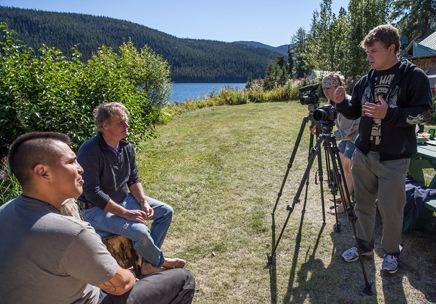If filmmaker Damien Gillis could make audiences respond in any one way to his documentary Fractured Land, it would be to have a more honest conversation about extractive industries.
"I hope it prompts them to ask deeper questions about some of the stories we're being told by government and industry and also the environmental community," said Gillis, who will be speaking after the 7 p.m. screening tonight at UNBC's Weldwood Theatre.
"Too often it's presented as a very simple conflict between the economy and the environment and it's much more complicated than that and it's much more human than that."
Gillis and co-director Fiona Rayher portray that human element through their protagonist, Caleb Behn, a Dene man from northeast B.C. who also lived in Prince George when he studied at University of Northern B.C.
The story is an "intimate portrait" of Behn, whose mother works as a senior person in the oil and gas industry and whose father is a residential school survivor and staunch critic of development on his territory.
"Caleb kind of embodies those different personalities and perspectives and very much walks in two worlds," Gillis said.
"He's a lawyer and wears a three-piece suit but he hunts moose, throws a tomahawk and I think in many ways through those eyes and him as a quintessential Canadian and indigenous figure, (he is) grappling with the big questions that face our country today."
Had the documentary come out two years ago, Gillis said he'd expect more controversy, but the current context is very different.
"There's a palpable disenchantment all around the province right now with this agenda because it hasn't borne fruit yet," said Gillis, but that is not always addressed by government.
Take last week's annual Natural Resource Forum in Prince George.
"I think there was probably more of that simple narrative told there: 'We've got to go and push through and get these LNG (liquefied natural gas) plants built or B.C. has no economic future,'" he said.
"There have to be real alternatives to that sort of heavy extraction but at the same time we can't just dismiss these questions off-hand either."
At the forum, Premier Christy Clark stood firm with the province's support of such industries.
"I'm not prepared to take advice from people who say we should halt all raw log exports, or put a moratorium on LNG, or stop Site C (hydroelectric dam) in its tracks, or do everything we can to make mining tougher to do," she said.
"I take the opposite view. And I don't have any quibbles about saying I'm someone who'll stand up for the resource sector. Absolutely we should have a diverse economy in B.C. and we do, but we should never ever forget what we depend on, the fundamental bedrock of British Columbia, and Canada, and what it is today, and that is the work that you do."
Gillis' family works in the industry, so he said he understands what is at stake.
"We weren't trying to skewer the oil and gas industry here but I don't think there's been a fair dialogue whatsoever in Canada about the benefits or the very real impacts and tradeoffs from the industry," he said.
That means looking beyond community borders, something Gillis hopes the film helps audiences accomplish.
"I hope that one of the things to come out of the film is that people recognize the decisions they make in communities like Kitimat and Prince George do have consequences for other people in other communities, like our central character Caleb.
"The fact of the matter is to supply the enormous amount of gas that would be required for even a few of the 21 LNG plants proposed in B.C., you'd have to see a major ramping up of fracking and that's going to mostly happen in northeast B.C."
Becoming a lawyer is a decision the viewer watches Behn wrestle with, said Gillis.
"It's not an easy choice to become a part of that very system that you see as being an instrument of your people's oppression. Like his mother who works inside the oil and gas industry, he's chosen to try and make change from the inside," Gillis said.
"As (Caleb) says in the film, he wanted to speak truth to power. He recognizes that the only (people) in this country that can speak to judges are lawyers. That was a difficult decision for him to make."
Ultimately, it's Behn that brings the story together, Gillis said.
"I think that's what made audience connect with the film: is that it's not an issue film or an environmental film, it tells a story about a compelling character," he said.



